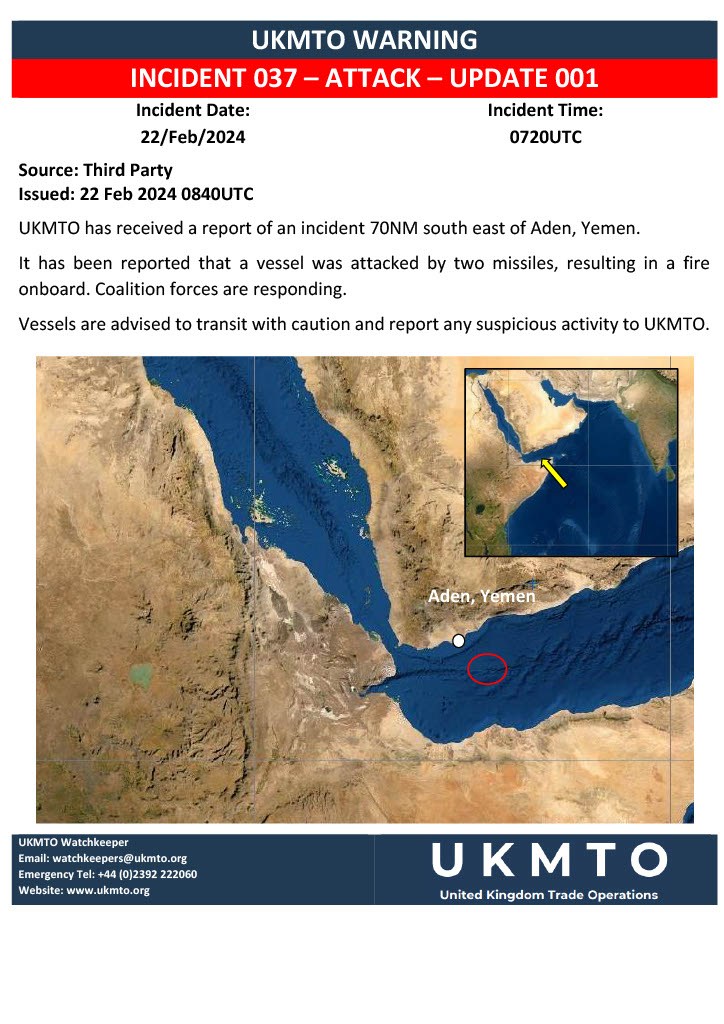DUBAI: Yemen’s Iran-aligned Houthis claimed responsibility for an attack on a UK-owned cargo ship and a drone assault on an American destroyer on Thursday, and they targeted Israel’s port and resort city of Eilat with ballistic missiles and drones.
The statement by a Houthi representative on social media site X came shortly after the group’s leader said it was ramping up attacks on ships in the Red Sea and other waters — including with new “submarine weapons” — to mirror Israel’s military operations in the Gaza Strip.
Houthi militants have launched repeated drone and missile strikes in the Red Sea, Bab Al-Mandab Strait and Gulf of Aden since November in support of Palestinians, as the Israel-Hamas war continues and the Gaza death toll reaches almost 30,000.
“Operations in the Red and Arabian Seas, Bab Al-Mandab Strait, and the Gulf of Aden are continuing, escalating, and effective,” Abdul Malik Al-Houthi added in a televised speech. He gave no details of the submarine weapons.
The group’s strikes are disrupting the vital Suez Canal trade shortcut that accounts for about 12 percent of global maritime traffic, and forcing firms to take a longer, more expensive route around Africa.
The Houthis on Thursday sent shippers and insurers formal notice of what they termed a ban on vessels linked to Israel, the US and Britain from sailing in surrounding seas, seeking to reinforce their military campaign.
The Houthis’ communication, the first to the shipping industry outlining a ban, came in the form of two notices from the Houthis’ newly dubbed Humanitarian Operations Coordination Center sent to shipping insurers and firms. The aim is to force sailing companies to collaborate with the Houthis to guarantee the safety of their ships,
Ships owned by individuals or entities in Israel, the US and UK or sailing under their flags are banned from the Red Sea, Gulf of Aden and Arabian Sea, Thursday’s notices said.
“The Humanitarian Operations Center was established in Sanaa to coordinate the safe and peaceful passage of ships and vessels that have no connection to Israel,” a senior Houthi official told Reuters on Thursday.

The months of attacks have upset global trade and reset shipping rates at a higher level. Insurance sources on Thursday said there was no change in rates since the issuance of the adviseries because marine underwriters had already restricted coverage availability or increased rates.
“In terms or marine war insurance availability and pricing, we don’t see a significant effect from the Houthi group’s recent announcement since it echoed similar announcements from last year to target Israel, US and UK-linked vessels,” Marcos Alvarez, managing director, global insurance ratings, Morningstar DBRS, told Reuters.
Militant leader Al-Houthi said retaliatory strikes by the US-British coalition have failed to stop its campaign.
Earlier on Thursday, two missiles set ablaze a ship some 70 nautical miles southeast of Aden, Yemen, the United Kingdom Maritime Trade Operations (UKMTO) agency said. The vessel and crew were reported safe and are proceeding to the next port of call, it said in a later update.
That UK-owned, Palau-flagged ship, the Islander, was en route to Egypt from Thailand, according to British maritime security firm Ambrey and ship tracking data.
The US military’s Central Command said in a social media post that the US shot down six Houthi drones in the Red Sea after they were identified as an imminent threat to US and allied warships.
No ships have been sunk nor crew killed during the Houthi campaign. However there are concerns about the fate of the UK-registered Rubymar cargo vessel, which was struck on Feb. 18 and its crew evacuated.
The Houthis said the Rubymar was at risk of sinking but a US defense official said it remained afloat.
Rubymar is “sitting lower still in the water,” Ambrey said. A salvage attempt was aborted and a navigation warning to nearby ships was in place, the firm said. Other options are under consideration, the vessel’s security company ISS-SAPU said.
Earlier on Thursday, Israel’s military also said it intercepted a target in the area of the Red Sea after sirens warning of incoming rockets and missiles sounded in the southern city of Eilat.
















